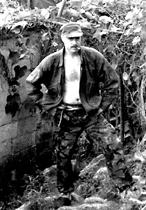The Early Years
Martin Campbell was born in Germany, in 1955. When he was two years old his
family moved to Jamaica. He soon discovered a talent for music and by the age of
seven was an accomplished pianist! After spending two years at the famous Alpha
Boys' School, Martin moved on to Military school. He also joined the Sea Cadets
where his aptitude for music was encouraged and he learnt to play the Side Drum
and Bugle.
The Sixties
During the mid sixties, Martin and his family moved to Halfway Tree. Around the
same time he obtained his first (Grundig) tape recorder. His early recordings
were of the songs he played on the piano – but it later lead to greater things!
In 1968 the family moved to Southern England.
The Seventies
With Martin's love of Jamaican music it wasn’t long before he began regularly
picking up the latest Reggae releases from a local shop. Amongst his early
influences, he cites Horace Andy, Dennis Brown, and Fred Locks. Martin says of
the music of those times: “Back in those days, when they used real musicians,
plus the combination of good quality recording equipment and techniques, the
result was a very tight sound, with a very heavy bottom (Bass) end.†In 1979,
Martin Campbell set up his first studio using a 4 track Teac recording deck
combined with an Alice 8 track mixing desk.
The Eighties
On a visit to Kingston in 1982, Martin checked out Channel One’s studio on Maxfield Avenue. The Hookim brothers were there recording, using a 2†16 track tape machine and were in session with studio engineer, Barnabus at the controls. The sound that Barnabus was achieving blew Martin away! He decided then and there that this was the equipment to be used to achieve the ‘Yard Sound’ that he (and others) would like and respect.
The Birth of Channel One (UK)
On a subsequent trip, Martin got to know Jo Jo Hookim, who was a major influential figure in his life. As a result of their conversation, the Channel One (UK)® label was set up as an outlet for Campbell’s work.
The Man on His Music
Martin Campbell outlines his philosophy on the music that he arranges, produces and sometimes sings, “My main aim is to continue to build and provide Roots-Reggae rhythms with a certain ‘feel’ or character for artists to voice. I think that the pace of the World is moving too fast and sometimes it’s nice just to slow the tempo a little. There’s plenty of the usual styles of music around, but I’d like to try and preserve something that’s more lasting and more permanent. After all, why should everything sound the same? It just becomes boring and staid.â€
